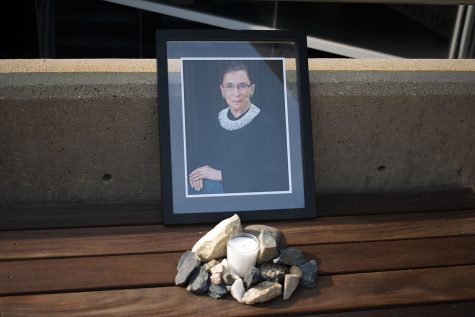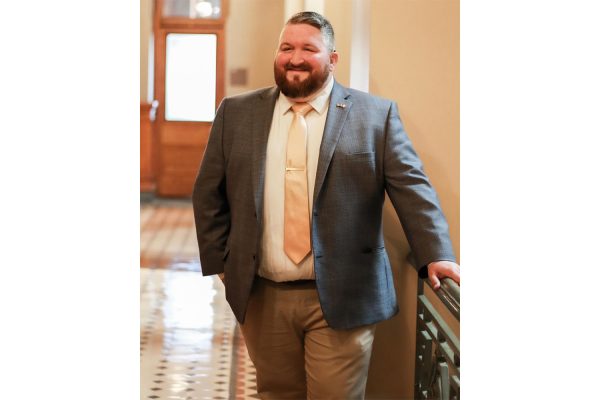UI professors teach on Ruth Bader Ginsburg’s legacy and future of the Supreme Court
While Senate Democrats and Republicans fight over filling the vacant seat on the Supreme Court, University of Iowa professors are teaching on the history of Ginsburg’s legacy and the future of the court.
A memorial sits outside of the Johnson County Courthouse on Saturday, Sept. 19, 2020. The memorial, likely for Supreme Court Justice Ruth Bader Ginsburg who died last night.
September 22, 2020
University of Iowa political science and law professors are reflecting on the legacy of U.S. Supreme Court Justice Ruth Bader Ginsburg and the battle over her nomination in their classes and in public forums, balancing what is an emotional and political conversation and trying to put it in a historical context.
Timothy Hagle, a UI political-science professor who teaches classes on constitutional law and the judicial process, said he spoke about the U.S. Supreme Court vacancy to his judicial process class on Tuesday. The class has a segment on the Supreme Court nomination process, but that won’t be covered for a couple of weeks.
“It’s kind of an odd situation where things I’m going to talk about over the next couple of weeks are things that would be good for them to know to help put what’s going on now into a better context in terms of why the Democrats are doing some things, why the Republicans are doing some things based on what’s happened in these previous battles,” he said.
While the battle over the Supreme Court vacancy is deeply political, Hagle said he wants to give his class the historical and constitutional context for what’s happening in the news and avoid favoring one political argument over another.
President Trump has made it clear that he wants to choose a nominee before the Nov. 3 election, and Senate Majority Leader Mitch McConnell said he would try to get a nomination process going before the election.
Many Democrats and some Republicans are opposed to Trump’s efforts to fast-track a nomination process, because in 2016, Republicans in the Senate would not hold a hearing for former President Barack Obama’s Supreme Court nominee after the death of Justice Antonin Scalia.
“I don’t see it as my place to try to convince them one way or the other, as far as these arguments,” he said. “My approach is always, ‘OK, this is what this side is saying this is what this side is saying …’ I will tell them somebody’s just not making a correct argument here as far as what the Constitution says and doesn’t say.”
RELATED: Grassley won’t oppose Supreme Court hearings
Incorporating the current nomination process into class has its challenges as it updates by the hour as more news comes out, but Hagle said it keeps the class interesting.
“The slight problem we’ve got in this particular instance is that I won’t get to that material for a couple of weeks and it’s happening right now,” Hagle said. “I wanted to provide at least a little bit of context to the students, because we’re going to talk about stuff later on that will make sense of what’s going on now.”
UI law Professor Andy Grewal, UI history Professor Emerita Linda Kerber, and Northwestern University law Professor Paul Gowder will hold a panel Wednesday titled “Justice Ginsburg’s Legacy and the Supreme Court’s future.”

Kerber said she wants to use her time on the panel to focus on the historical world that Ginsburg began her career in, and the strides she made for women’s rights. While Kerber isn’t teaching classes this semester, she said that if she were, she would want to teach about Ginsburg’s legacy as a pioneer of gender equality.
Kerber noted in an interview that when Ginsburg graduated law school, discrimination on the basis of sex wasn’t illegal.
“So, you can privilege one sex over the other, or you can burden one sex instead of the other,” she said. “And that permeates our world so that people don’t even have words for it, they don’t need it. There’s no phrase ‘sex discrimination.’ That’s not in the dictionaries.”
Kerber said while teaching law in the early ‘60s, Ginsburg created one of the first courses in sex discrimination in the country, and even when the idea was not well known, she collaborated with other professors and lawyers to write one of the first case books on sex discrimination.
RELATED: Women of the UI law school mourn RBG, reflect on gender identity
Kerber also said she wanted people to understand that while Ginsburg is rightfully lauded as a defender of women’s rights, she also afforded men rights that they didn’t have before she began her career, such as social-security compensation for men whose spouses had died.
“She is as strongly a defender of men, and men nowadays have many rights which they did not have before Ruth Ginsburg defended them,” Kerber said.
Ann Estin, associate dean for faculty and family law professor, said she began a class this week with a photo of Ginsburg on her lecture slides and took time to honor her memory during class. Estin was teaching this week on the parental rights of unmarried parents, and she said Ginsburg advanced gender equality in areas of family law.
“It was an appropriate place to mention Justice Ginsburg, who was very committed to eradicating those kinds of distinctions that limited not just women but also men,” she said.
Estin said she also highlighted in class Ginsburg’s legacy as a pioneer for women in the legal profession.
“She’s the generation of path makers who made my career possible, and that’s something I have gratitude for,” Estin said.
















